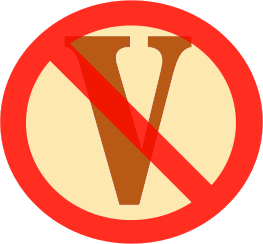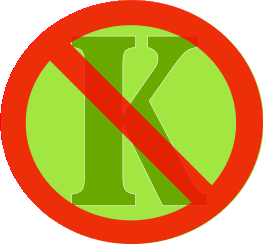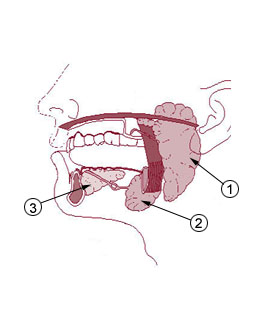MOUTH HEALTH REMEDIES

 Categories in DigestionAppetiteStomachSmall IntestineColonAnal RegionMouthTeethPancreasAbdominal Pain LocationAbdominal Pain TypeAlarm SymptomsOverviewTeeth should be a bright white. If they appear yellowish or gray, that is also a sign of toxins. To be thorough, check the color of the back of the throat and the underside of the tongue as well. Even if you don't know what the signs means, check your tongue in the mirror every day. To keep your mouth healthy, brush your teeth, floss, and scrape your tongue every day. Avoid foods that leave a bad taste in your mouth 20 minutes later. Avoid chewing gum. Don't know your body type? Take our free Dosha quiz!
TAKE THE QUIZ
     (5.00 out of 5 stars) 2 ratings, 26 likes (5.00 out of 5 stars) 2 ratings, 26 likes SAVE SYMPTOM SAVE SYMPTOMChewing & Your Health 50% of digestion begins in the mouth. So if you have digestive problems, you can usually fix it with your teeth! The most powerful tools you have to digest and absorb nutrients well are your teeth. Your teeth...      (5.00 out of 5 stars) 1 rating, 54 likes (5.00 out of 5 stars) 1 rating, 54 likes SAVE SYMPTOM SAVE SYMPTOMXerostomia, or dry mouth is a subjective feeling that the mouth is too dry. The terms comes from the Greek: Xeros = dry and stoma = mouth. This condition is commonly called pasty mouth or cotton mouth and effects 20% of the population. Lips may stick... 21 likes  SAVE SYMPTOM SAVE SYMPTOMLoss of taste and flavor makes it hard for you to choose the right foods for your body. Impaired taste can cause you to eat too little and lose weight, or it could make you eat too much and gain weight. Impaired taste can predispose you to using too... 17 likes  SAVE SYMPTOM SAVE SYMPTOMA sweet taste on the tongue is experienced when the saliva tastes noticeably sweet. It is caused by elevated blood sugar levels, often due to a rich, sweet diet. A sweet taste on the tongue may follow an infection in the sinus, nose, or throat. This... 20 likes  SAVE SYMPTOM SAVE SYMPTOMBlood has a metallic taste. Bleeding gums, gastrointestinal bleeding and acid reflux may cause a metallic taste. 108 likes  SAVE SYMPTOM SAVE SYMPTOMThe body doesn't make foul odors. As blood sugar levels rise, saliva becomes sweet, feeding bacteria in the mouth. Thus, sweet foods cause bad breath. These bacteria produce waste products that have a foul odor. Bacteria will also feed on a thick... 31 likes  SAVE SYMPTOM SAVE SYMPTOMThe body doesn't make foul odors. Sweet foods cause a foul taste on the tongue. As blood sugar levels rise, saliva becomes sweet, feeding bacteria in the mouth. These bacteria produce waste products that have a foul odor. Bacteria will also feed on a... 28 likes  SAVE SYMPTOM SAVE SYMPTOMA hoarse voice could be a sign of acid reflux, smoking, stuffed nose, dry air, dry palate, overuse of the voice, and upper respiratory infection. The vagus nerve also affects the muscles and tension in the vocal chords. 35 likes  SAVE SYMPTOM SAVE SYMPTOMSores inside the mouth are often a sign of inflammation throughout the GI tract. Acidic foods like tomato or vinegar, irritating foods like coffee or chilis may aggravate intestinal mucosa, or flareups of intestinal bacteria may cause inflammation. 15 likes  SAVE SYMPTOM SAVE SYMPTOMTension in the jaw area is a sign of struggle. Attempts to "toughen up" or "grin & bear it" tend to cause tension and soreness in the jaw. Pain in this area may also indicate infection and abscess of a tooth. This condition should be checked by a... 23 likes  SAVE SYMPTOM SAVE SYMPTOMA popping or clicking jaw is generally related to stress making the jaw tense, poor alignment of the neck and spine. The jaw is related to the throat chakra issue - responsible for filtering as well as integrating thoughts, desires and moral... 47 likes  SAVE SYMPTOM SAVE SYMPTOMBacteria naturally proliferate when the blood is sweet or rich after sweet or rich foods. This is especially true for the gums, which are exposed to the outside air. Toxicity in the blood further irritates tissues, making them vulnerable to infectious... 30 likes  SAVE SYMPTOM SAVE SYMPTOMGum inflammation is often secondary to either toxicity (Vata or Pitta type), or sweet blood (Kapha Type). Sweet blood, or blood high in sugar, is attractive to the organisms that cause tooth decay. 19 likes  SAVE SYMPTOM SAVE SYMPTOMBleeding gums may be a sign of infection in the gums, often due to inadequate flossing or food stuck between the teeth. 
AYURVEDIC FACE ASSESSMENT
Learn how to assess constitution by a person's face.
|
Join Joyful Belly.
Want our top Ayurvedic recipes and health tips?Subscribe to our free newsletter!













